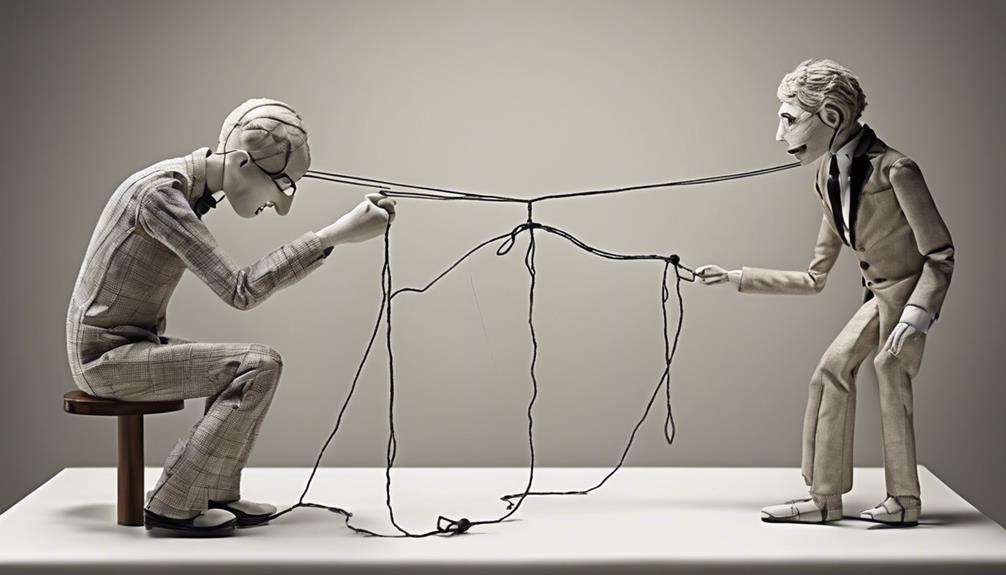As we explore the enigmatic realm of narcissists' relationship desires, one cannot help but wonder about the intricate web of needs and expectations that underpin their interactions.
What lies beneath the surface of their seemingly insatiable thirst for admiration and control? The complexities of their yearnings in relationships offer a glimpse into a world where power, recognition, and dominance intertwine with vulnerability and insecurity.
Join us as we unravel the multifaceted layers of narcissistic desires, shedding light on the compelling yet tumultuous dynamics that define these captivating partnerships.
Key Takeaways
- Narcissists seek loyalty for constant admiration and unquestioning compliance for control.
- They desire fluctuating self-esteem and validation of self-importance in relationships.
- Narcissists prioritize their desires over their partner's feelings, seeking power and dominance.
- Manipulative behaviors like gaslighting and love bombing are used to maintain superiority and manipulate emotions.
Traits Desired in a Partner
When considering the traits desired in a partner by narcissists, loyalty, unquestioning compliance, and a fluctuating self-esteem are paramount. Narcissists seek partners who'll validate their sense of self-importance and cater to their needs without question.
Loyalty is valued as it ensures a constant source of admiration and attention. Unquestioning compliance allows narcissists to maintain control and power within the relationship, reinforcing their desired dynamic. A partner with a fluctuating self-esteem is preferred, as it can make the narcissist feel more significant and needed.
These traits create an environment where the narcissist's desires and emotions take precedence, fostering a relationship where their sense of self-worth is consistently reinforced.
Desired Relationship Feelings

What emotions do narcissists desire to experience in their relationships?
Narcissists seek to feel powerful and more important than their partners. They crave a sense of dominance and control, desiring to be at the center of attention in the relationship. This need for superiority often stems from underlying insecurities and a fragile self-esteem.
By feeling powerful and significant, narcissists attempt to validate their own self-worth and importance. In this pursuit, they may overlook or dismiss their partner's feelings, focusing primarily on their own desires and needs.
This dynamic can lead to challenges in fostering genuine emotional intimacy and mutual understanding within the relationship.
Relationship Expectations
In relationships with narcissists, their expectations often revolve around feeling responsible for others, seeking high status, and expecting their partners to be willing to set aside their own needs. This dynamic can create a sense of imbalance where the narcissist's desires take precedence, leading to a one-sided relationship where the partner's needs are secondary.
The narcissist's expectation of passivity and forgiveness can put significant pressure on the partner, as they may feel compelled to constantly cater to the narcissist's demands while suppressing their own desires. This can result in feelings of neglect and frustration for the partner, as their own needs and emotions are overlooked in favor of fulfilling the narcissist's expectations.
Need for Attention

With an insatiable need for attention at the core of their desires, narcissists seek constant validation and praise from their partners to feel recognized and valued. This craving for attention often stems from deep-seated insecurities and a fragile sense of self-worth.
The relentless pursuit of admiration and acknowledgment can become overwhelming for those in a relationship with a narcissist, as their hunger for attention knows no bounds. Partners may find themselves constantly catering to the narcissist's need for validation, walking on eggshells to ensure they receive the attention they crave.
Failure to provide this attention can lead to feelings of neglect and trigger outbursts of frustration and anger from the narcissist, creating a challenging dynamic in the relationship.
Desire for Admiration
Moving from the intense need for attention, the focus shifts to the narcissist's insatiable desire for admiration in relationships. This yearning for admiration drives much of their behavior and interactions with their partner. Here are four key aspects to consider:
- Constant Validation: Narcissists crave constant praise and acknowledgment from their partner to feed their fragile self-esteem.
- Need for Admiration: They seek admiration to feel superior and important, often expecting their partner to put them on a pedestal.
- Frustration and Anger: When lacking the admiration they seek, narcissists can become frustrated and even display anger towards their partner.
- Dependency on Admiration: Their self-worth is heavily reliant on the admiration they receive, making it a crucial component in their relationships.
Worship and Control Desires

Exhibiting a relentless need for adoration and dominance, narcissists in relationships often seek to be worshipped and maintain control in various aspects of their lives. This desire for worship and control can manifest in their relationships through a preference for public displays of love and admiration, as well as a strong inclination towards maintaining control in all spheres of life. Here is a visual representation to elaborate further:
| Worship Desires | Control Desires |
|---|---|
| Need to be adored | Desire for control |
| Desire for public displays of love | Preference for being in control |
| Seeking constant admiration | Control in all aspects of life |
| Desire for partner's worship | Potential volatility if control is challenged |
Seeking Validation

In the realm of relationships, narcissists' craving for validation is a driving force that influences their behaviors and interactions with their partners. Seeking validation fulfills their deep-seated need for external affirmation and admiration, shaping the dynamics of their relationships.
Here are four key aspects to consider when understanding a narcissist's pursuit of validation:
- Constant Reassurance: Narcissists require continual praise and acknowledgment to validate their self-worth.
- Validation of Superiority: They seek validation to reinforce their belief that they're superior to their partner.
- Emotional Dependency: Validation acts as a form of emotional sustenance, feeding their fragile self-esteem.
- Manipulative Tactics: Narcissists may use validation as a tool to control and manipulate their partner's emotions and actions.
Understanding these facets can provide insight into the complexities of a narcissist's validation-seeking behavior.
Desire for Public Displays

The desire for public displays of affection and admiration is a prominent aspect of narcissists' relationship preferences, reflecting their need for external validation and control.
Narcissists often seek validation from others to boost their self-esteem and feel powerful in a relationship. Public displays of affection serve as a means for them to showcase their perceived superiority and importance, craving admiration from both their partner and onlookers.
This desire for public validation can be intense, leading narcissists to prioritize appearances over genuine emotional connections. When their need for public admiration isn't met, narcissists may feel a sense of frustration and anger, as it threatens their sense of control and superiority in the relationship.
Control and Volatility

Narcissists' need for control in relationships can often manifest in volatile behavior when their sense of dominance is challenged. This desire for control can lead to unpredictable and sometimes explosive reactions when their partner asserts independence or questions their authority. Understanding the dynamics behind this behavior is crucial for maintaining a healthy relationship with a narcissist.
Here are some insights into control and volatility in relationships with narcissists:
- Fear of Losing Power: Narcissists fear losing control over their partner and will go to great lengths to maintain dominance.
- Manipulative Tactics: They may use manipulation and coercion to ensure their partner complies with their wishes.
- Emotional Rollercoaster: The relationship can become a rollercoaster of highs and lows, with intense emotions driving erratic behavior.
- Escalation of Conflict: Any challenge to their control can lead to an escalation of conflict, resulting in emotional outbursts or even abuse.
Frequently Asked Questions
How Do Narcissists Typically React When Their Partner Questions Their Behavior or Actions?
When our partner questions our behavior, we often react defensively, feeling challenged and attacked. We may become dismissive or turn the blame on them. Communication can deteriorate rapidly as we struggle to maintain control and avoid vulnerability.
What Are Some Common Red Flags That Indicate a Narcissist May Be Feeling Insecure in a Relationship?
When a narcissist feels insecure in a relationship, common red flags may include excessive need for validation, jealousy, controlling behavior, and seeking constant admiration. These signs can indicate deeper issues within the relationship.
How Do Narcissists Manipulate Their Partners to Prioritize Their Needs Over Their Own?
How do narcissists manipulate their partners to prioritize their needs over their own? They exploit guilt, demand constant attention, and utilize emotional manipulation. By fostering dependency, they ensure their desires take precedence, often at the expense of their partner's well-being.
What Are Some Tactics Narcissists Use to Ensure They Receive Constant Attention and Admiration From Their Partner?
We strive to manipulate through charm, guilt, and emotional manipulation. By demanding constant validation and admiration, we ensure our ego is constantly fed. Our need for control can lead to volatile reactions if our desires are challenged.
How Do Narcissists Respond When They Feel Their Control in a Relationship Is Being Challenged or Threatened?
When control is challenged, we react fiercely. Our need for power and adoration fuels our response. We demand submission and obedience, seeking to maintain our dominance. Challenges threaten our fragile self-image and provoke intense reactions.
Conclusion
In unraveling the desires of narcissists in relationships, we uncover a world of complexity and contradiction. From their craving for control to their insatiable need for admiration, the tumultuous terrain of narcissistic dynamics is filled with tension and turmoil.
Despite their captivating allure, navigating relationships with narcissists requires careful consideration and self-awareness. Understanding their desires can shed light on the intricate interplay of emotions, expectations, and behaviors.
Let's tread cautiously as we navigate the nuanced landscape of narcissistic relationships.









